Vietnam and the Netherlands working on sustainable aquaculture in the Mekong Delta
“By working together, we have remarkable opportunities to empower farmers with the knowledge, technologies, and resources to adopt sustainable practices, improve their livelihoods, and create lasting economic and environmental benefits,” Mr. Daniël Stork, Consul General of the Netherlands in Ho Chi Minh City emphasized at a business forum where stakeholders gathered to discuss sustainable aquaculture in the Mekong Delta.
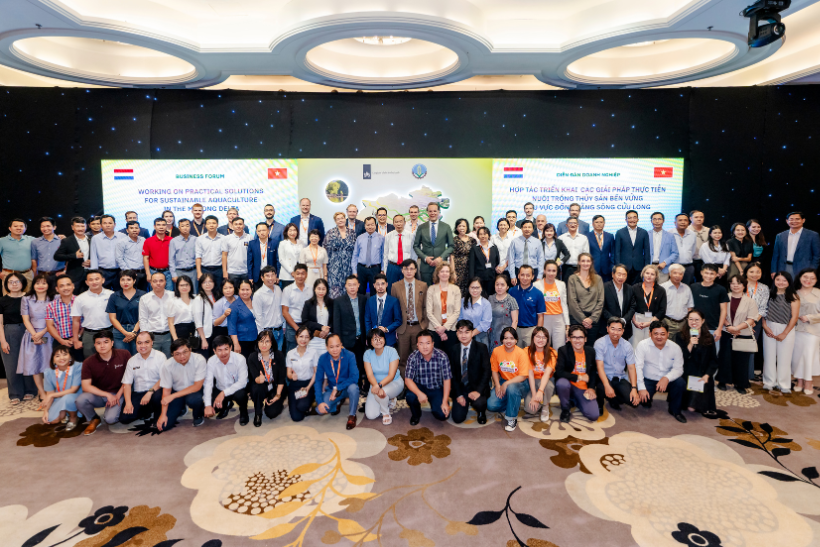
The business forum “Vietnam and the Netherlands working on practical solutions for sustainable aquaculture in the Mekong Delta” held on 27th of November, 2024 in Can Tho City saw the participation of nearly 200 attendees from the public and private sectors, including national and local authorities, businesses from both the Netherlands and Vietnam, as well as representatives from universities, knowledge institutes, organizations, and the media. The forum provided a platform for both sides to present developments and explore potential cooperation through the implementation of practical solutions and the facilitation of knowledge exchange and technology transfer. It also addressed the challenges that the aquaculture sector in the Mekong Delta is currently experiencing, and explored expert recommendations for solutions.
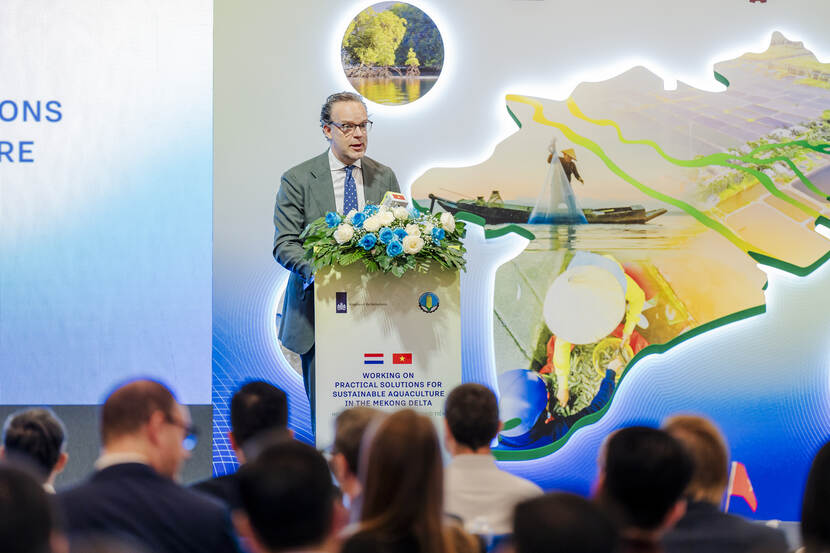
Two delta nations
Vietnam and the Netherlands share a special bond as delta nations, as well as face similar challenges and opportunities related to agriculture, water management, and climate change, said the Consul General of the Netherlands in Ho Chi Minh City. This year marks the 10th anniversary of the strategic partnership between Vietnam and the Netherlands in sustainable agriculture and food security. “Over the past decade, our strategic partnerships have enabled meaningful collaboration on sustainable agriculture, food security, water management, and climate change. These efforts have been instrumental in promoting innovation, applied research, and putting in practice practical solutions towards sustainable and resilient development of agriculture in Vietnam”, he highlighted.
Aquaculture is a crucial component of the socio-economic development of Vietnam; however, the sector is facing significant challenges, including sustainable production, disease management, rising production costs, environmental pressures, more demanding market requirements, as well as water management issues. “The Netherlands has long been recognized for its expertise in sustainable practices and advanced technologies in agriculture. We take pride in offering tailor-made solutions that address the unique challenges faced by aquaculture practitioners in Vietnam,” the CG stated. The Netherlands also launched combi-track, an integrated approach with the aim to mobilize relevant Vietnamese and Dutch public and private stakeholders to work together to support the growth of climate-smart and sustainable aquaculture.
Practical solutions for sustainable development
In his remarks at the event, Vietnamese Deputy Minister of Agriculture and Rural Development Phung Duc Tien, appreciated the event for its commitment to identifying practical solutions for developing sustainable aquaculture in the Mekong Delta, based on the region's specific conditions and realities. The Mekong Delta accounts for 12.3 percent of Vietnam’ area, 17.4 percent of its population and 12 percent of the country’s GDP; leading the country in rice, aquaculture products and fruit production (2023). Over the years, the Vietnamese government has issued numerous policies to promote the region’s potential and advantages, driving socio-economic development in the Mekong Delta. In particular, Resolution No. 120/NQ-CP dated November 17, 2017 on Sustainable Development of the Mekong Delta in Adaptation to Climate Change identified the construction of an agricultural production structure with three key focuses: aquaculture - fruit trees - rice associated with ecological sub-regions, in which aquaculture (freshwater, brackish water, saltwater) is considered the major product.
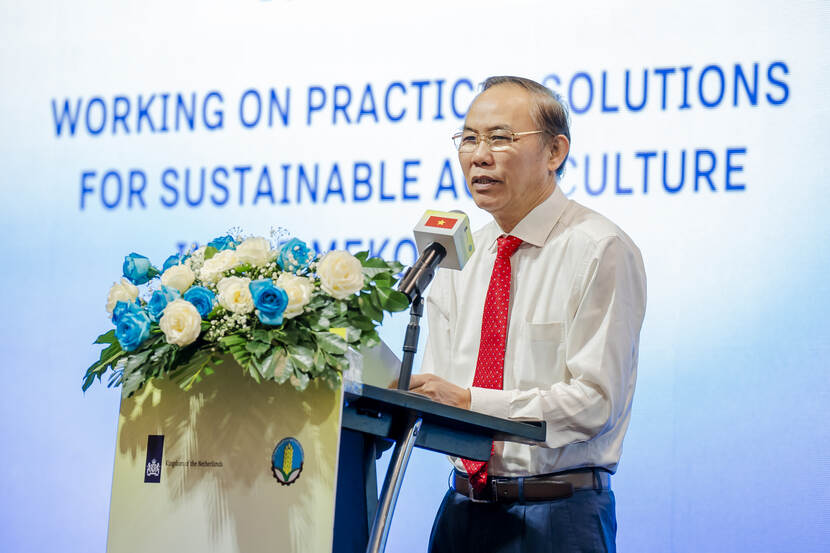
According to Deputy Minister Tien, with natural advantages from the river system and vast plains, the Mekong Delta is the largest center for aquatic product farming and export of Vietnam. However, the region is facing many challenges including pollution, industrialization, modernization, urbanization, and waste, which have caused considerable impacts on local rivers. Deputy Minister Tien also mentioned small-scale farming, poor infrastructure, limited awareness among farmers, and diseases as significant challenges for the region. “The Netherlands is a country with strengths in nutrition research, cooperative management, research, and application of high technology in aquaculture. These are areas where Vietnamese research institutions and enterprises can cooperate to develop,” he stated.
Current state of the Mekong Delta’s aquaculture
Nguyen Van Huu, Deputy Director of the Aquaculture Division, Department of Fisheries under the Ministry of Agriculture and Rural Development attended the event to present the current state of the aquaculture sector in the Mekong Delta. In 2023, the Mekong Delta covered 910,000 ha of aquaculture production area, accounting for 70 percent of the national area, and produced 3.34 Mt of aquaculture products which was 65 per cent of the national total. Last year, fishery exports from the Mekong Delta reached US$5.98 billion, representing 65 percent of the country’s total export value. The region takes advantage of strengths from comprehensive legal framework, favorable natural conditions, abundant labor force, high production capacity and technological innovation. On the other hand, being heavily reliant on export markets, having limited access to advanced technologies, environmental issues, as well branding challenges have been among the Mekong Delta aquaculture’s disadvantages.
By 2030, the Mekong Delta aims to expand the total aquaculture area to over 990,000 ha and increase aquaculture production to over 4.8 Mt. Also, ensuring all concentrated aquaculture areas are equipped with systems for environmental monitoring, disease management, and food safety; as well as certifying over 20 percent of the aquaculture area with GAP, organic, or other recognized quality standards, are among the goals.
The disease triangle
One of the highlights of the event was a panel discussion where experts discussed the disease triangle formed by the host - the pathogen - the environment and how they interact with each other. In this triangle, the health of the fish or shellfish (host) is critical, as strong, well-fed, and stress-free animals are less likely to get sick; while stressed, weak, or undernourished ones become more vulnerable to disease. Pathogens are disease-causing agents, like bacteria, viruses, or parasites. Even a healthy host can fall ill if it encounters the right pathogen, especially if the pathogen is strong and virulent, or the host is weak, or the environmental conditions are suboptimal. Meanwhile, the environment – including water temperature, oxygen levels, pH and ammonia – all play a role. Pathogens can thrive in certain conditions, and poor water quality can stress the host, making them more susceptible to disease.
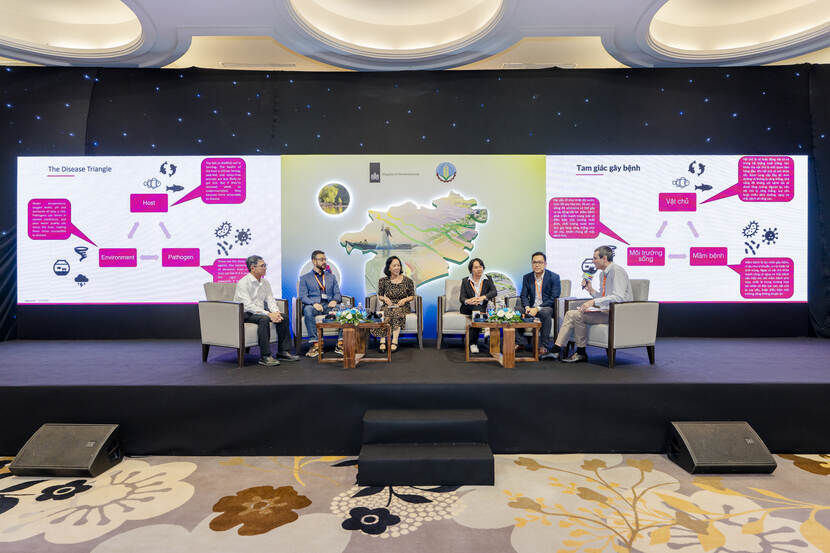
Ms. Dang Thi Hoang Oanh, senior lecturer from the College of Aquaculture and Fisheries, Can Tho University emphasized that it is important to keep the environment as good as possible for the fish to live in by paying attention to the stocking density, as high density can cause easy disease transmission. She also suggested improving feed quality, which could help enhance the immune response and various other aspects of health functions for the host. Mr. Hoang Nhu Phuc, managing director of ShrimpVet suggested farmers set up a nursery system with a 3 to 4-week duration which works like a quarantine area. This allows farmers to routinely quarantine the stock to ensure that it is free of diseases prior to putting them into the growing ponds. Other suggestions from the experts included stabilizing water quality factors, applying early and preemptive diagnosis, and vaccinating the fish to protect them against common pathogens.
Bridging knowledge to practice
Knowledge is important, but applying it in practice is just as crucial. According to Mr. Vu Ngoc Ut, Dean of College of Aquaculture and Fisheries, Can Tho University, the sector is facing many challenges in applying education and research into reality. These include the insufficient linkage between academia and the industry, research focus misaligned with farmers’ specific needs, limited research investment, low adoption of advanced technology or technique by farmers, as well as the lack of the capacity building for the farmers. Ut recommended more regular training courses for the farmers, more research based on the real needs of local farmers, and more projects to work closely with small-scale farmers.
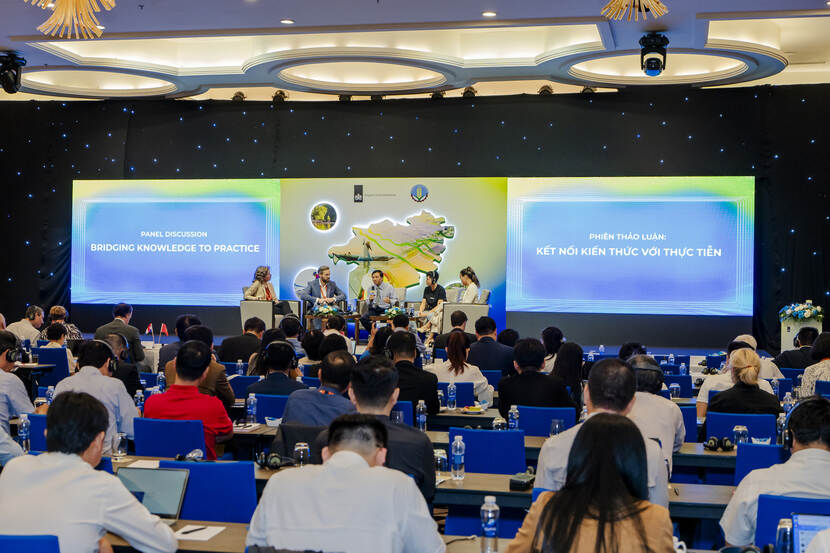
Collaboration between private and public sectors
In the Netherlands, 2.3 percent of the GDP is invested in R&D, and investments come from both the private and public sectors. “This close collaboration between private sector, education institutes and research institutes, government and civil society organisations, leads to the shared agenda. They develop the knowledge and innovation agenda together, focusing on societal challenges, such as climate change, food security, and economic challenges,” Ms. Sabrina Waltmans – Senior Policy Advisor of the Netherlands’ Ministry of Agriculture, Fisheries, Food Security and Nature, Department of International Education, Knowledge and Innovation – said at the event.
“Involving the businesses, the public sector and academia, is a way to make sure that this is not just a conference, not just a seminar, but that actually the businesses afterwards put things into practice which will stay because it's part of an economic model,”said Consul General of the Netherlands in Ho Chi Minh City Daniël Stork who closed the event. “Let's translate these insights into concrete actions that will contribute to a thriving, sustainable agriculture industry in the Mekong Delta, one that brings lasting benefits to farmers, to cooperatives, businesses, and communities alike.”
Movie about aquaculture combitrack in Vietnam
A short movie “Flowing Towards Sustainable Aquaculture” was premiered in the Business Forum “Vietnam - the Netherlands working on practical solutions for sustainable aquaculture in the Mekong Delta” in Can Tho on 27 November, 2024.
Watch the full movie at: Flowing Towards Sustainable Aquaculture - Hướng tới phát triển Nuôi trồng thủy sản bền vững
Download presentations and photos
For photos and presentations at the forum and more information about the Vietnam and the Netherlands working on sustainable aquaculture in the Mekong Delta, please click here
Do you have any questions for the agriculture department? Please send an email to HAN-LVVN@minbuza.nl. For the latest updates, news funding opportunities and more, follow us on X @AgroVietnam and LinkedIn Netherlands Agricultural Network in Vietnam.